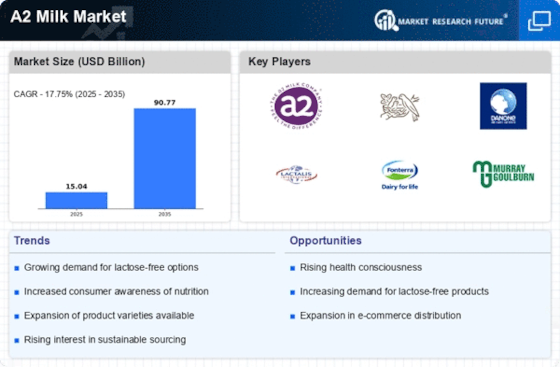Market Trends
Key Emerging Trends in the A2 Milk Market
The global A2 milk market is witnessing a surge in demand as consumers seek alternatives to conventional dairy products due to digestive concerns associated with milk consumption. Extensive research has revealed that beyond lactose intolerance, protein intolerance, specifically related to the A1 protein found in traditional milk, can contribute to digestive issues. The A1 Beta-Casein protein present in regular milk, derived from breeds like Holstein, can potentially cause stomach pain and various gastrointestinal problems.
In response to these concerns, A2 milk has emerged as a natural and healthier alternative, produced by certain older breeds of cows such as Guernsey, Jersey, Holstein, and Brown Swiss. A2 milk is characterized by the absence of the A1 protein and, consequently, the peptide BCM-7, which is produced through the enzymatic hydrolysis of A1 Beta-Casein and has been associated with adverse effects on the intestines. This crucial distinction positions A2 milk as a digestive-friendly option, addressing the concerns of individuals who experience discomfort or digestive issues with traditional milk.
Consumer preferences are evolving as awareness of the potential benefits of A2 milk continues to grow. The natural production of A2 milk by specific breeds of cows aligns with the increasing demand for wholesome and minimally processed food options. As consumers become more health-conscious and seek products that align with their well-being, A2 milk is gaining prominence as a nutritional and digestive-friendly choice.
Furthermore, the shift in consumer preferences is influenced by an increasing awareness of A2 milk's advantages over conventional milk. The dissemination of information regarding the potential digestive discomfort caused by A1 protein has prompted consumers to seek alternatives that address these concerns. The unique composition of A2 milk, free from the problematic A1 protein, positions it as a suitable choice for individuals looking for a gentler and more easily digestible option.
The positive trajectory of the global A2 milk market is also attributed to factors such as the inherent health benefits associated with A2 milk. Beyond its digestive advantages, A2 milk is rich in essential nutrients, including proteins, vitamins, and minerals. The nutritional profile of A2 milk contributes to its appeal among consumers who prioritize health and nutrition in their dietary choices.
The market's growth is not only driven by individual consumers seeking A2 milk for personal consumption but also by its integration into various food and beverage products. Manufacturers are recognizing the potential of A2 milk as an ingredient in a wide range of dairy-based products, including yogurt, cheese, and infant formulations. This diversification of A2 milk applications expands its reach and offers consumers multiple avenues to incorporate it into their diets.
As the awareness of A2 milk continues to spread, the market is anticipated to witness sustained growth. The increasing number of health-conscious consumers, coupled with a rising understanding of the potential digestive benefits of A2 milk, positions it as a key player in the evolving dairy market. Consumer education initiatives, product innovation, and strategic marketing efforts will further contribute to the widespread adoption of A2 milk as a preferred choice among individuals seeking a wholesome, easily digestible, and nutritionally advantageous dairy option.


















Leave a Comment